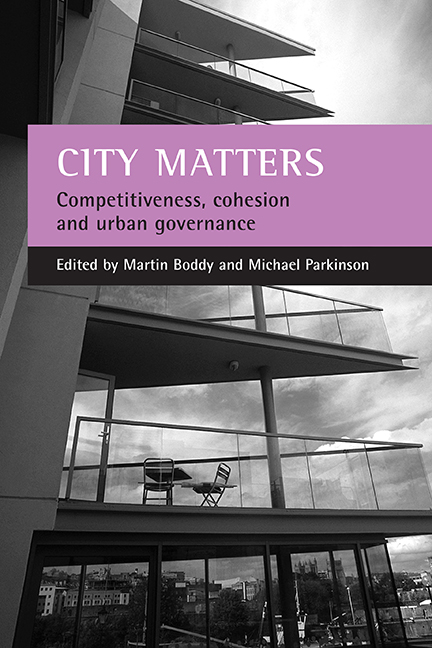Book contents
- Frontmatter
- Contents
- List of tables and figures
- Foreword
- Acknowledgements
- Notes on contributors
- one Introduction
- Part One Competitiveness, cohesion and urban governance
- Part Two Competitiveness and urban change
- Part Three Competitiveness, innovation and the knowledge economy
- Part Four Housing, property and economic performance
- Part Five Space, place and social cohesion
- Part Six Ethnicity, enterprise and social cohesion
- Part Seven Leadership, governance and social capital
- Conclusions
- Index
one - Introduction
Published online by Cambridge University Press: 20 January 2022
- Frontmatter
- Contents
- List of tables and figures
- Foreword
- Acknowledgements
- Notes on contributors
- one Introduction
- Part One Competitiveness, cohesion and urban governance
- Part Two Competitiveness and urban change
- Part Three Competitiveness, innovation and the knowledge economy
- Part Four Housing, property and economic performance
- Part Five Space, place and social cohesion
- Part Six Ethnicity, enterprise and social cohesion
- Part Seven Leadership, governance and social capital
- Conclusions
- Index
Summary
Cities are now back firmly on the UK policy agenda. Between the 1960s and the early 1990s, the focus was all on urban problems and the challenges posed by ‘those inner cities’, as Margaret Thatcher disparagingly referred to them in 1987. Following two or more decades of decline, it seemed that cities were synonymous with economic decline, physical decay, shrinking populations and social deprivation. The 1990s, however, saw a sea change in how our towns and cities were viewed. The idea that cities were the dynamos of the UK national economy, vital to the competitiveness of ‘UK plc’, rather than economic basket cases as they were sometimes portrayed, seized the imagination of politicians, pundits, academic researchers and business leaders alike. Cities are now increasingly seen as economic assets rather than urban liabilities. There have been very real signs of renewed investment, cultural development and an appetite for urban lifestyles. Urban living and the quality of urban life, culture and environment have been increasingly recognised as cornerstones of a civilised and progressive society, much as they always had been in continental Europe. Even the problems of inner-city areas were recast in the language of social exclusion and social cohesion alongside growing recognition that economic success has often been associated with continuing or worsening problems in terms of social equity.
Reflecting this, the future of our towns and cities has been increasingly central to national government policy, particularly since Labour’s return to power in 1997. There has been a whole raft of enquiries, reports and policies designed explicitly to promote and enhance the interests of our urban areas. The most significant include the 1999 report of the Urban Task Force led by Sir Richard Rogers (Urban Task Force, 1999), the government White Paper, Our towns and cities: The future (DETR, 2000), the government’s Neighbourhood Renewal Strategy and related policy measures that built on the work of the Cabinet Office Social Exclusion Unit. Following these came the government’s ‘Communities Plan’1 (ODPM, 2003), which set out strategies for managing pressures of urban growth in booming southern England alongside plans for the renewal of low-demand areas elsewhere in the country.
- Type
- Chapter
- Information
- City MattersCompetitiveness, Cohesion and Urban Governance, pp. 1 - 10Publisher: Bristol University PressPrint publication year: 2004



